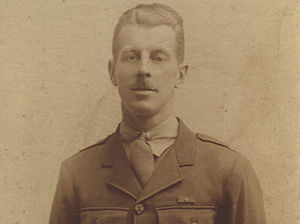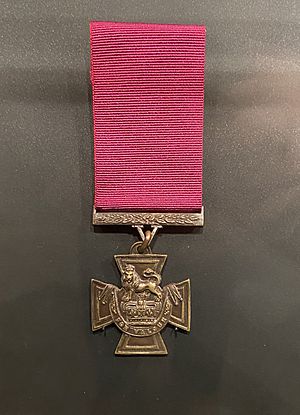Alfred Joseph Knight facts for kids
Quick facts for kids
Alfred Joseph Knight
|
|
|---|---|
 |
|
| Born | 24 August 1888 Birmingham, West Midlands, England |
| Died | 4 December 1960 (aged 72) Birmingham, West Midlands, England |
| Buried |
Oscott College Road Cemetery, Sutton Coldfield
|
| Allegiance | |
| Service/ |
|
| Years of service | 1914−1919 |
| Rank | Second Lieutenant |
| Service number | 370995 |
| Unit | London Regiment Sherwood Foresters |
| Battles/wars | World War I |
| Awards | Order of the British Empire |
Second Lieutenant Alfred Joseph Knight (born August 24, 1888 – died December 4, 1960) was a brave British Army officer. He received the Victoria Cross (VC), which is the highest award for courage given to British and Commonwealth soldiers. It's given for amazing bravery when facing the enemy. Alfred Knight was the only soldier from the Post Office Rifles to ever get this special award.
Contents
Early Life and Work
Alfred Joseph Knight was born in Birmingham, England, on August 24, 1888. He went to St Philip's School in Edgbaston.
Before joining the army, he worked for the Post Office. He was a Clerical Assistant in the North Midland Engineering District. In May 1915, he married Mabel Saunderson.
Bravery in World War I
When World War I began, Alfred Knight joined the army. He was 29 years old and a sergeant in the 2/8th (City of London) Battalion of The London Regiment. This unit was also known as the Post Office Rifles.
The Victoria Cross Action
On September 20, 1917, a very important event happened in Ypres, Belgium. Sergeant Knight's platoon (a small group of soldiers) was under heavy fire from an enemy machine-gun. It was a very dangerous situation.
Sergeant Knight showed incredible courage. He rushed forward alone, even though his own side's bombs were still exploding. He managed to capture the enemy machine-gun position all by himself.
He performed several other acts of bravery alone that day. He did all of this while under heavy machine-gun and rifle fire, not thinking about his own safety. All the officers in his company were hurt before they reached their first goal. Because of this, Sergeant Knight took command. He led not only his own men but also other platoons that had lost their officers. He worked tirelessly to organize and strengthen their position.
Later, Alfred Knight was promoted to the rank of Second Lieutenant.
Life After the War
After World War I ended, Alfred Knight continued to serve his country in a different way. He worked for the Ministry of Labour. He became the Manager of the Employment Exchange.
When he retired in 1951, he was the Senior Wages Inspector for the Midlands area of the Ministry of Labour. In the same year, he was given another honor: he was made a Member of the Order of the British Empire.
Alfred Knight was also a member of a Catholic organization called The Catenian Association. He held several important roles within this group.
Honoring Alfred Knight
In 2005, the city of Birmingham decided to honor Alfred Knight. They named a street after him in the Park Central area of Ladywood, which is where he grew up.
In 2017, Royal Mail (the postal service) dedicated a special postbox to him. This postbox is located in Birmingham, on the street where Alfred lived when he worked for the Post Office.
Alfred Knight passed away at his home on December 4, 1960, at the age of 72. He is buried in Oscott Catholic Cemetery in New Oscott, Birmingham.
The Medal
Alfred Knight's Victoria Cross medal is a very important historical item. It is kept safe at the British Postal Museum & Archive.


